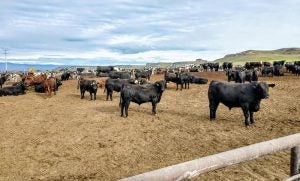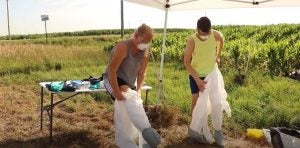You’ve probably heard the word biosecurity referencing animal health, but many still ask what exactly is it?
Basically, biosecurity protects our food system from disasters — both natural and manmade — and is how we prevent diseases from being transferred to people, animals, and properties. The goal of biosecurity is to keep diseases off farms and/or prevent them from spreading farther.
The United States Department of Agriculture’s National Institute of Food and Agriculture (NIFA) runs many agricultural biosecurity programs — which include monitoring and controlling viruses, bacteria, funguses, parasites, and other organisms and contaminants. Through these programs, NIFA helps to detect animal diseases, performs research to guide legislation, and provides support to farmers.

There are many additional state, national and international organizations working to advance biosecurity on a large scale by providing research, resources and guidelines to help farmers keep their animals healthy.
While these organizations work on a large scale, many individual farms also have biosecurity measures in place, including things like:
- Washing down each vehicle that enters the property
- Only having one entrance/exit
- Only allowing in authorized visitors
- Camera or other surveillance systems
- Each person entering a facility must shower before and after visiting a bio-secure location
- Keeping facilities clean
- Providing disposable footwear to guests and/or provide shoe sanitization stations
- Keep wild animals off the property and away from farm animals
- Deterring pests and insects
- Following a veterinarian-approved vaccination program
- Providing fresh food and water to animals
- Having separate housing for sick or susceptible animals away from the general population
- Quarantining new or returning show animals for two weeks to watch for any signs of disease or illness
Sick animals can also be reported to a farmer’s local veterinarian, extension office, or even state and federal veterinarians who can provide support and guidance in the event that it is a contagious or zoonotic disease (which is any disease that can naturally be passed from animal to human). By following these foundational biosecurity measures, farmers can help keep people and animals from getting sick. They promote animal welfare and ensure a safe food supply.
Places such as botanical gardens and research farms also have plans in place to keep out foreign pests, diseases, fungi, and bacteria. Biosecurity measures can even keep invasive species out of lakes, rivers, parks, and other protected areas and prevent invasive species from reaching new countries and states.

While good disease-prevention strategies are important for broader human health and trust in our food system, it also is vital to a farmer’s financial sustainability. By minimizing losses to diseases, agriculture becomes more stable and profitable. For example, if a disease affects the majority of pigs, there would be a huge impact on our food system. Prices would rise and it would be much harder to find pork products.
By practicing good biosecurity measures, we can prevent impacts of major diseases by preventing them from spreading before they can have a big effect.
Recently, biosecurity has been helpful in minimizing the spread of avian influenza. The USDA’s Animal and Plant Health Inspection Service’s (APHIS) Defend the Flock program provides resources, research, and response plans in an effort to protect flocks from avian influenza. APHIS is also working to keep diseases like African Swine Fever (ASF) out of the United States. Both of these diseases have the potential to have a major impact on agriculture.
Biosecurity is an important part of agriculture today. Biosecurity measures improve animal welfare, sustainability, and profitability all while protecting our food system and keeping people, animals and plants safe from diseases. You can be sure that agriculture is working to keep you, animals and our food system safe.
Michelle Miller, the “Farm Babe,” is an internationally recognized keynote speaker, writer, and social media influencer and travels full time to advocate for agriculture. She comes from an Iowa-based row crop and livestock farming background and now resides on a timber farm in North Central Florida.



